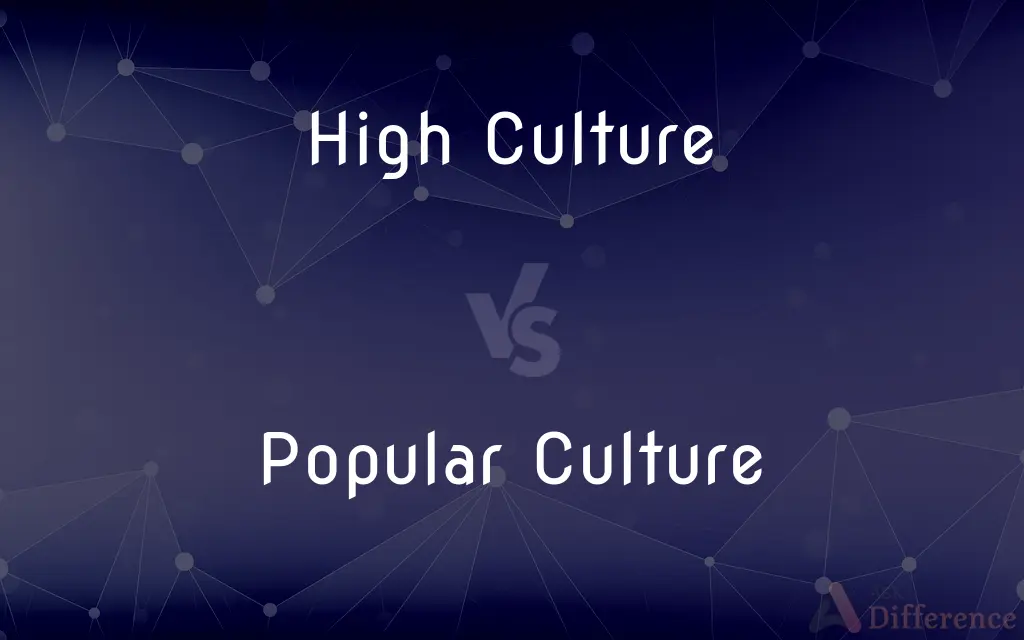High Culture vs. Popular Culture — What's the Difference?
By Tayyaba Rehman — Published on November 18, 2023
High Culture refers to classical arts and intellectual works admired by educated elite, while Popular Culture encompasses mainstream, commercial entertainment and trends enjoyed by the general public.

Difference Between High Culture and Popular Culture
Table of Contents
ADVERTISEMENT
Key Differences
High Culture pertains to the artistic and intellectual creations that are typically associated with the educated and upper classes. Popular Culture, on the other hand, relates to the daily lives, interests, and activities of the broader population.
High Culture often encompasses works that have stood the test of time, such as classical literature, art, and music. Popular Culture is dynamic and ever-changing, reflecting current societal trends, fads, and innovations in media.
While High Culture may require deeper knowledge or understanding to appreciate fully, Popular Culture is designed to be easily accessible and understood by a wide audience. This doesn't mean Popular Culture lacks depth, but it is more immediate in its appeal.
High Culture, traditionally, has been preserved and promoted by institutions like museums, symphonies, and universities. Popular Culture is often disseminated through mass media channels like television, radio, and the internet.
The distinction between High Culture and Popular Culture can sometimes blur, especially in contemporary society where elements of both can coexist in singular works or platforms, but they generally serve different societal functions and audiences.
ADVERTISEMENT
Comparison Chart
Audience
Educated elite
General public
Temporality
Timeless, historic
Dynamic, contemporary
Accessibility
May require deeper understanding
Easily accessible and understood
Preservation and Promotion
Museums, symphonies, universities
Television, radio, internet
Main Focus
Intellectual and classical arts
Mainstream entertainment and trends
Compare with Definitions
High Culture
Often associated with the educated and elite classes.
Opera houses have long been venues where High Culture is celebrated.
Popular Culture
Represents mainstream entertainment and trends.
Reality TV shows have become a significant part of Popular Culture.
High Culture
Upheld by formal institutions and scholars.
The university's focus on classical literature fosters an appreciation for High Culture.
Popular Culture
Disseminated through mass media and commercial channels.
Music festivals and award shows are major events in the Popular Culture calendar.
High Culture
Requires an in-depth understanding for full appreciation.
Reading ancient philosophical texts immerses one in the depths of High Culture.
Popular Culture
Easily accessible to the general public.
Social media trends are a dynamic component of Popular Culture.
High Culture
Pertains to classical arts and intellectual achievements.
The symphony is an epitome of High Culture, showcasing centuries of musical evolution.
Popular Culture
Reflects current societal interests and fads.
The rise of superhero movies indicates their dominance in Popular Culture.
High Culture
Represents timeless works that have historical significance.
Renaissance paintings are a testament to the enduring impact of High Culture.
Popular Culture
Constantly evolving based on societal shifts.
Fashion trends change seasonally, showcasing the fluidity of Popular Culture.
Common Curiosities
Is High Culture better than Popular Culture?
Neither is "better"; they serve different purposes and appeal to different audiences.
What is High Culture?
High Culture refers to classical arts and intellectual works typically admired by the educated elite.
Can Popular Culture become High Culture over time?
Yes, some elements of Popular Culture can achieve enduring significance and be considered High Culture in the future.
How do mass media channels influence Popular Culture?
Mass media greatly influences Popular Culture by disseminating trends and shaping public opinion.
Can High Culture be entertaining and Popular Culture be intellectual?
Absolutely! The distinction is not strict, and there can be overlap.
How is High Culture preserved?
High Culture is often preserved in institutions like museums, symphonies, and universities.
Can an element belong to both High Culture and Popular Culture?
Yes, some works or trends can straddle both, especially in contemporary society.
What defines Popular Culture?
Popular Culture encompasses mainstream entertainment, trends, and activities enjoyed by the general public.
What are examples of Popular Culture?
Examples include reality TV shows, pop music, and trending social media challenges.
How do educational institutions impact High Culture?
They often teach and preserve the tenets of High Culture, fostering appreciation and understanding.
Which is more widespread, High Culture or Popular Culture?
Popular Culture, by definition, has a wider reach as it relates to the broader population.
Why is High Culture sometimes seen as "exclusive"?
Because it's often associated with the educated elite and may require deeper knowledge to appreciate.
How has the internet affected Popular Culture?
The internet has accelerated the spread and evolution of Popular Culture, making it more globalized and interconnected.
Who decides what constitutes High Culture?
Historically, scholars, critics, and institutions have played a role, but societal appreciation also matters.
Does Popular Culture have historical significance?
Yes, Popular Culture can reflect societal values and changes, making it historically significant.
Share Your Discovery

Previous Comparison
Mobile Phones vs. Cell Phones
Next Comparison
Mayan Calendar vs. Aztec CalendarAuthor Spotlight
Written by
Tayyaba RehmanTayyaba Rehman is a distinguished writer, currently serving as a primary contributor to askdifference.com. As a researcher in semantics and etymology, Tayyaba's passion for the complexity of languages and their distinctions has found a perfect home on the platform. Tayyaba delves into the intricacies of language, distinguishing between commonly confused words and phrases, thereby providing clarity for readers worldwide.
















































